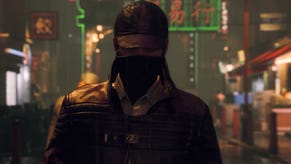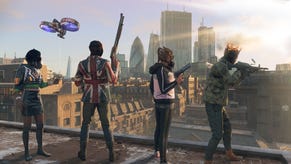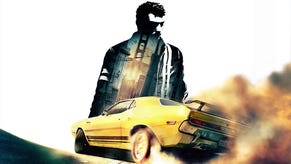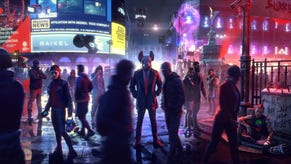Watch Dogs: Finding Morality in Useless Information
Watch Dogs' Profiler means there's a fewer crimes in Aiden's digital city of Chicago.
This article first appeared on USgamer, a partner publication of VG247. Some content, such as this article, has been migrated to VG247 for posterity after USgamer's closure - but it has not been edited or further vetted by the VG247 team.
I don't know how you play open-world games like Grand Theft Auto, Just Cause, or Sleeping Dogs, but I'm not the nicest protagonist. I'm don't usually get to the point of destroying everything in my path, but if I run over a few civilians or blow up an innocent bystander here and there, no foul. Things happen. Civilians and other NPCs in games are treated by most players as an afterthought. In the last generation of consoles, we began to approach the point where they were even a minor curiosity.
I play Watch Dogs a bit differently.
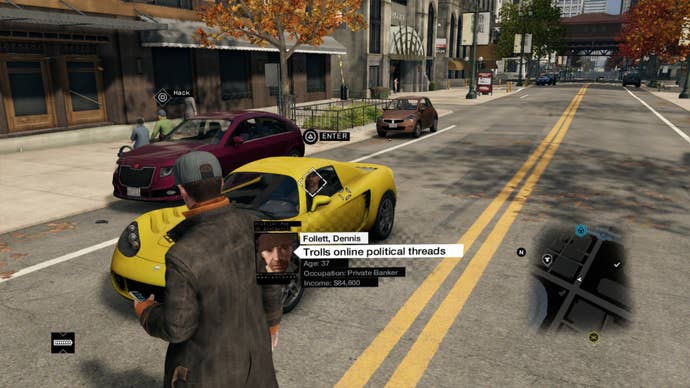
Part of the hacking aspect of the game is the Profiler, Aiden's smartphone-based app that gives you look at each NPCs life. Profiler information is rather useless as it's randomly-generated just like each NPC's overall look. You find out a target's name, how old they are, their occupation, overall income, and a single random fact about them. Together, they paint a barebones picture about the person you're about to hack, carjack, knock out, or shoot.
With the Profiler on, I approach things differently. That NPC is an investment advisor making over $100,000 who just got back from vacation; I'm fine skimming a bit off the top of their bank account. Is that thug an animal lover making under $25,000? I'll just knock him out instead of putting a bullet in his head. Hey, that's a nice car and you don't believe in evolution; I'll take that $500 off your hands. There's whole sections virtual Chicago where I try commit no crimes: the high-poverty Wards and the blue collar Brandon Docks. I figure they have enough issues, without me taking their money, vehicles, and lives..
It's gotten to the point that I avoid taking cars with drivers in them at all. The first ability I unlocked, Car Unlock allows you to take parked vehicles without setting off the alarms. It's probably my most-used ability. Much of my playtime involves running into alleys and parking lots looking for a getaway vehicle; I wouldn't want to take a car from someone who really needed it.
I even feel bad about running NPCs over as I'm sprinting away from the cops or finishing a race. Ubisoft Montreal turns off the Profiler while you're driving - probably because you're moving too fast for the information to be useful - but running over and killing a pedestrian acts as a hit against your reputation. Every time I careen around a corner and see "Civilian Killed" with a red and white down arrow icon, I cringe a little. I always prevent another crime to make up for it. Which is odd because the reputation system doesn't particularly feed into anything in Watch Dogs. It doesn't give you any specific benefits like it does in the Infamous series, just the occasional quote or news item while you're out and about.
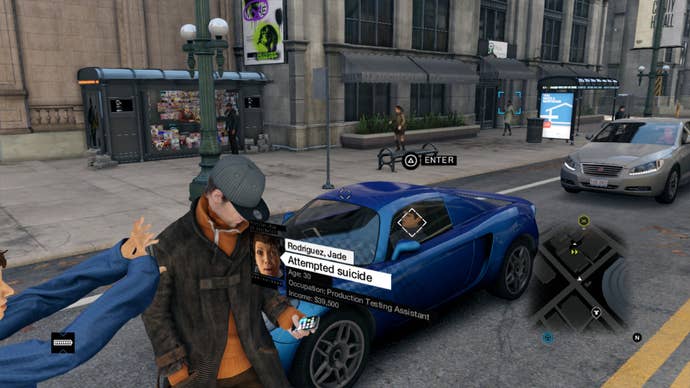
I know the Profiler information is what changes my playstyle, because I'll the ram the hell out of NPC vehicles while driving around the city. The Profiler's off, so there's no information. Without that context, I don't feel bad for totaling an NPC's car, or getting them caught in a traffic light hack while I'm evading the police.
Certain protagonists tend to lend themselves to certain playstyles, but I find that's not the case here. In Grand Theft Auto V, I found that playing as the psychopathic Trevor felt right for causing general mayhem. In Just Cause 2, Rico is there to cause trouble; everything I destroyed fed into that narrative. In Sleeping Dogs, the fact that I played undercover Detective Wei Shen meant I tended to be harder on criminals and less worried about taking civilian vehicles to stop crimes.
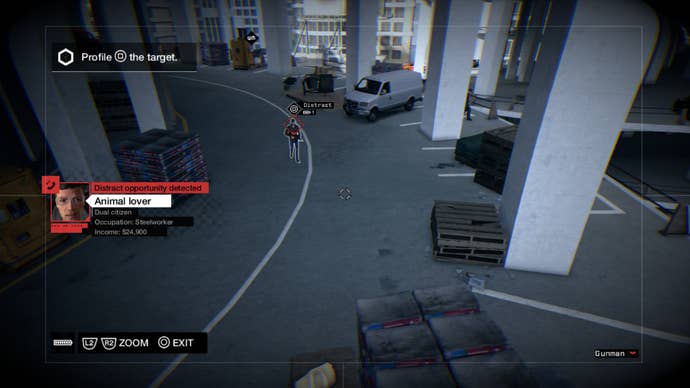
Watch Dogs' Aiden Pierce is a horrible person. Most of the problems in the game stem from his actions and the death of his niece can be directly attributed to his time as a criminal in the prologue. He survives on what I call "Punisher Heroism": he's the hero because the people he's fighting against are much worse. There's no real innate goodness there. At his best, Aiden wants to protect his sister's family. At his worst, many of his actions do the opposite. He is an out-and-out criminal, aligned with criminals, fighting other criminals that have wronged him. I don't feel bad for the NPCs because I'm in Aiden's shoes.
No, these morals are coming from my interaction with those throwaway words. Titles like "banker" or "nurse", and pithy statements like "prescribed new anti-anxiety pills" or "descended from slave traders" strike emotional chords. The Profiler information doesn't factor into anything long-term; if I carjack a single mother or recovering drug addict, I won't later find them homeless, destitute, or dead. Once I drive away, they probably cease to exist. But when they're in front of me, I'm honestly asking myself if I would commit a crime against them. That says something about my morals. There are people I'm willing to commit crimes against, even in the abstract, and others I'd never try to hurt. There's a different line for each and every one of us, and some introspection is probably a good thing.
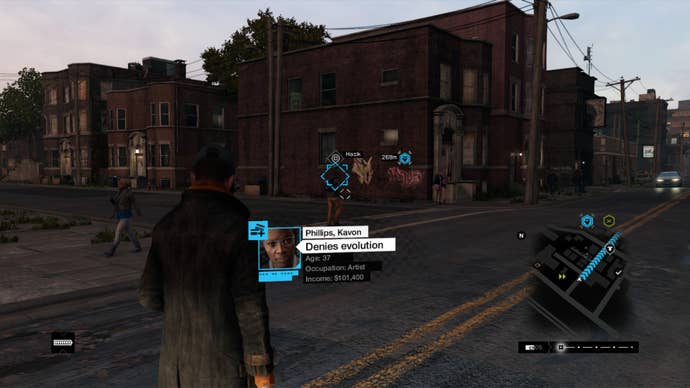
For all Watch Dogs gets wrong - empathizing with Aiden, its treatment of women in the story campaign, a complete lack of positive hacking interactions - one thing it did get right is making me give a damn about civilians that populate this open-world city. I mean, not enough that I drive the straight and narrow and never cause any mayhem, but it's more than completely ignoring their existence. And all it took was a few random words attached to every NPC. Wonder how much farther Ubisoft and the rest of the industry can take that idea in this generation?



